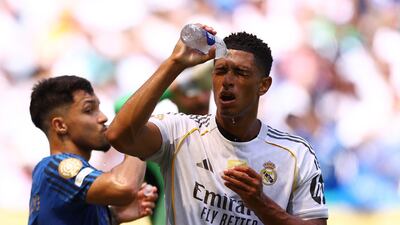Fifa's new flagship Club World Cup came to a close on Sunday with English side Chelsea crowned champions of the 32-team competition.
Never one to pass up the chance of hyperbole, Fifa president Gianni Infantino has already declared it "the most successful club competition in the world.”
The financial windfall for the London club was staggering, earning just over $114 million for one month's work.
The other participating clubs didn't fare too badly either, sharing the rest of the $1 billion pot, by far the biggest payout in Fifa's history.
But the expanded Club World Cup was not without its problems. Seen as a dress rehearsal for next year's World Cup, to be held in the USA, Canada and Mexico, empty seats marked the tournament. Slashed ticket prices, searing heat, unfavourable kick-off times, weather-delayed matches and player complaints over the standard of pitches are just a few of the areas Fifa must address before the 2026 global finals.
Dangerously high temperatures and violent storms
The temperature was over 32° Celsius for many matches played across the US, with humidity that made pitch-side conditions feel closer to 38°C.
“Honestly, the heat is incredible,” Chelsea midfielder Enzo Fernandez said. “Playing in this temperature is very dangerous.”
Six games were delayed by weather for a total of 8 hours, 29 minutes, raising questions over the suitability of the US for next year's World Cup during a time of global warming. Only four of the 11 US World Cup venues have roofs, including one that isn't temperature controlled.
At the 1994 World Cup in the US, just seven of 52 games had local nighttime starts to allow for matches to be broadcast during the evenings for European television.
Violent storms also wreaked havoc across the tournament.

US rules mean play is stopped when lightning is recorded within a 10-mile radius, and cannot restart until 30 minutes after it finishes. Two Benfica games, against Auckland and Chelsea, were delayed for about 120 minutes.
There were only four minutes left when that Chelsea game was held up. The Blues were winning 1-0, but Benfica levelled before Chelsea won in extra time.
"I think it's a joke, to be honest," Chelsea boss Enzo Maresca said at the time.
Possible solutions are planning around kick-off times to avoid playing in hot cities in the middle of the day, as so often happened at the Club World Cup, while seven of the venues used this summer won't be used in 2026.
Player welfare
For the top players, the Club World Cup meant they likely faced three consecutive years of summer tournaments, following the European Championship and Copa America last year and leading to the World Cup for national teams in 2026.
The two finalists, Chelsea and Paris Saint-Germain, played their 64th and 65th competitive games respectively since mid-August. Each team will have 33-35 days off before 2025/26 openers.
Manchester City manager Pep Guardiola said the impact of the new tournament might not be known until midway through next season.
“I may say: ‘So listen, we are a disaster. We are exhausted. The [Club] World Cup destroyed us,'” he admitted.
Sergio Marchi, the president of world players’ union FIFPro, accused Fifa of choosing to “continue increasing its income at the expense of the players’ bodies and health”. Marchi likened football's governing body's approach to the ‘bread and circuses’ tactics used by Emperor Nero in ancient Rome and warned there could be no repeat of playing matches in such extreme heat at next summer’s World Cup.

Other coaches expressed their concerns over player welfare.
Juventus coach Igor Tudor said that 10 of his players asked to be substituted during their last-16 defeat to Real Madrid at Hard Rock Stadium in Miami.
"The exhaustion was incredible," Tudor said after the match. "There's the tension of this match, which burns your energy. Then there's this heat, which really gets to you, and the third thing that completes the conditions is playing in this humidity."
Borussia Dortmund subs watched the first half of one game from the changing room to avoid the sun - and manager Niko Kovac said he was "sweating like I've just come out of a sauna" during his side's group win over Mamelodi Sundowns in Cincinnati, Ohio.
Fifa guidelines currently rely on the wet bulb globe temperature (WBGT), a measure of heat stress combining temperature and humidity.
If the WBGT exceeds 32°C, cooling breaks are mandatory in both halves of a match.
FIFpro has said breaks should be introduced once the WBGT goes above 28°C, and matches should be delayed if it exceeds 32°C.
Empty stadiums
Among the lasting lessons was Fifa's decision to dramatically drop ticket costs as some kick-off times approached, which could impact decisions by fans thinking of attending next year's World Cup.
Fifa lowered the cost to attend the Chelsea-Fluminense semi-final at MetLife Stadium in East Rutherford, New Jersey, to $13.40 from $473.90. Ticket for Sunday's final between Chelsea and European champions Paris Saint-Germain dropped from $330 to $199.60.
Four matches failed to get more than 10,000 fans, with the lowest attendance the 3,412 who watched Mamelodi Sundowns beat Ulsan HD 1-0.

There will be 104 matches at next year's expanded 48-team World Cup and many are likely to be on weekday afternoons. Fifa has not said whether it will use dynamic pricing at that tournament and has declined to comment on discounting.
The 63 matches at the 2025 Club World Cup attracted crowds of around 2.49 million, about 62% of the listed capacity. Fifa has refused to comment on the estimated 1.5 million unfilled seats.
One reason given for low attendances have been the kick-off times, with many being at noon or 3pm on a weekday afternoon.
Tiny US television audience
Empty seats at the stadiums was only half the problem Fifa must address ahead of the 2026 World Cup.
Streaming service DAZN bought world rights for the Club World Cup, sublicensed 24 of the 63 matches to TNT Sports, which averaged 418,000 viewers for the first 23 matches with English-language commentary on TNT, TBS and truTV. Seventeen matches sublicensed to TelevisaUnivision with Spanish commentary averaged 551,000.
By comparison, NBC's networks averaged 510,000 viewers per match window for the English Premier League in 2024/25, regular-season Major League Baseball is averaging 1.841 million this year on Fox and 1.74 million on the cable network ESPN. The NFL averaged 17.5 million during the 2024 regular season.
DAZN has not yet released figures but says it will during the week.





